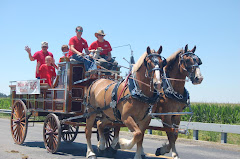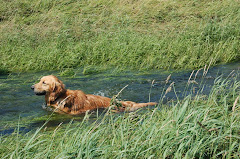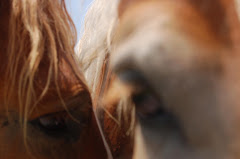
Is your dog afraid of thunderstorms and terrified of fireworks? Does he/she become increasing anxious, pacing and panting? Or perhaps your dog panics, fleeing for a place to hide? Or maybe, he/she becomes destructive? If this is the case, you are not alone. My four year old Jack Russell terrier, Scoop, exhibits some of these behaviors even before a storm is evident to me. Below is an handout I have created on Canine Noise Fears and Phobias. At the end of the article, I have included a great website devoted to animal behavior by Dr. Rolan Tripp, a veterinarian specializing in animal behavior.

Fear is a physiologic, behavioral and emotional reaction to stimuli that an animal encounters. this reaction results in an increase in heart rate, panting, sweating, trembling, pacing and possibly urination and defecation. The animal may respond by fleeing and hiding.
A phobia is an intense response to a fear.....which is out of proportion to the stimulus. Noise phobia is an excessive, unreasonable fear response to certain loud noises. It is more common in dogs than cats. It can result in all the above signs plus destructive behavior. The most common noise phobias are to fireworks and thunderstorms.
Thunderstorms
Dogs live in a different sensory world than we do. They hear and smell things which we do not. Because of this, dogs can react to the darkening sky, the drop in barometric pressure, high winds, lightening and of course thunder. So while a noise phobia may be the main issue in a thunderstorm, these other sensory occurrences can also trigger the phobia.
Fireworks
Similar to thunderstorms, dogs react to the noise of fireworks. However, they can also react to the bright glare and smell of fireworks.
Treating Noise Fears and Phobias
Many pet owners make the common mistake of trying to calm and soothe the pet when they are acting fearful or anxious. Sure seems like the natural thing to do, right?.....just like children, we want to reassure them that everything is going to be okay. Well, this actually the wrong thing to do. When you pet and reassure your dog while they are having a panic attack, this action tells them that their panicking is okay and pleasing to you. In other words, you are reinforcing their anxiety. So, the first treatment is to stop your behavior which reinforces their behavior. And I know this is difficult....just ask my husband! He wants to pickup Scoop and put him in bed with us......under the covers! (They are both afraid of storms if the truth be told)
Behavior modification and retraining can be used to treat fear of noise. Mild signs of anxiety can be overcome by having a "fireworks" party. When the first faint fireworks start, you respond happily and reward your dog with a treat. Using a happy, cheerful voice and rewarding with small food treats during every firework boom can recondition your dog. Along these same lines, using a recording of thunderstorms and rewarding your dog for good (non-fearful) behavior can relieve some anxiety and fear. As mentioned earlier, though, it can be difficult to treat some phobias because dogs sense changes in barometric pressure, wind and light. These factors can be difficult to recreate for behavior modification.
Dogs with moderate to severe phobias and panic attacks may need medication to not only reduce their anxiety but also keep them from harm....especially dogs which flee and run or dogs which become destructive. Since most state laws require a pet examination within 12 months to receive any prescription medication, you should notify your veterinarian of your pet's fear or phobia well in advance. This will allow your veterinarian to examine your pet and prescribe the best medication.
Summertime brings both thunderstorms and fireworks which can be stressful to some pets. Using these basic tips described can help relieve your dog's anxiety. However, if your pet reacts excessively or develops harmful behaviors, do not hesitate to call your veterinarian. For excellent behavior tips and advice, I recommend the Animal Behavior Network at www.animalbehavior.net which is founded by Dr. Rolan Tripp, a veterinarian specializing in animal behavior.










